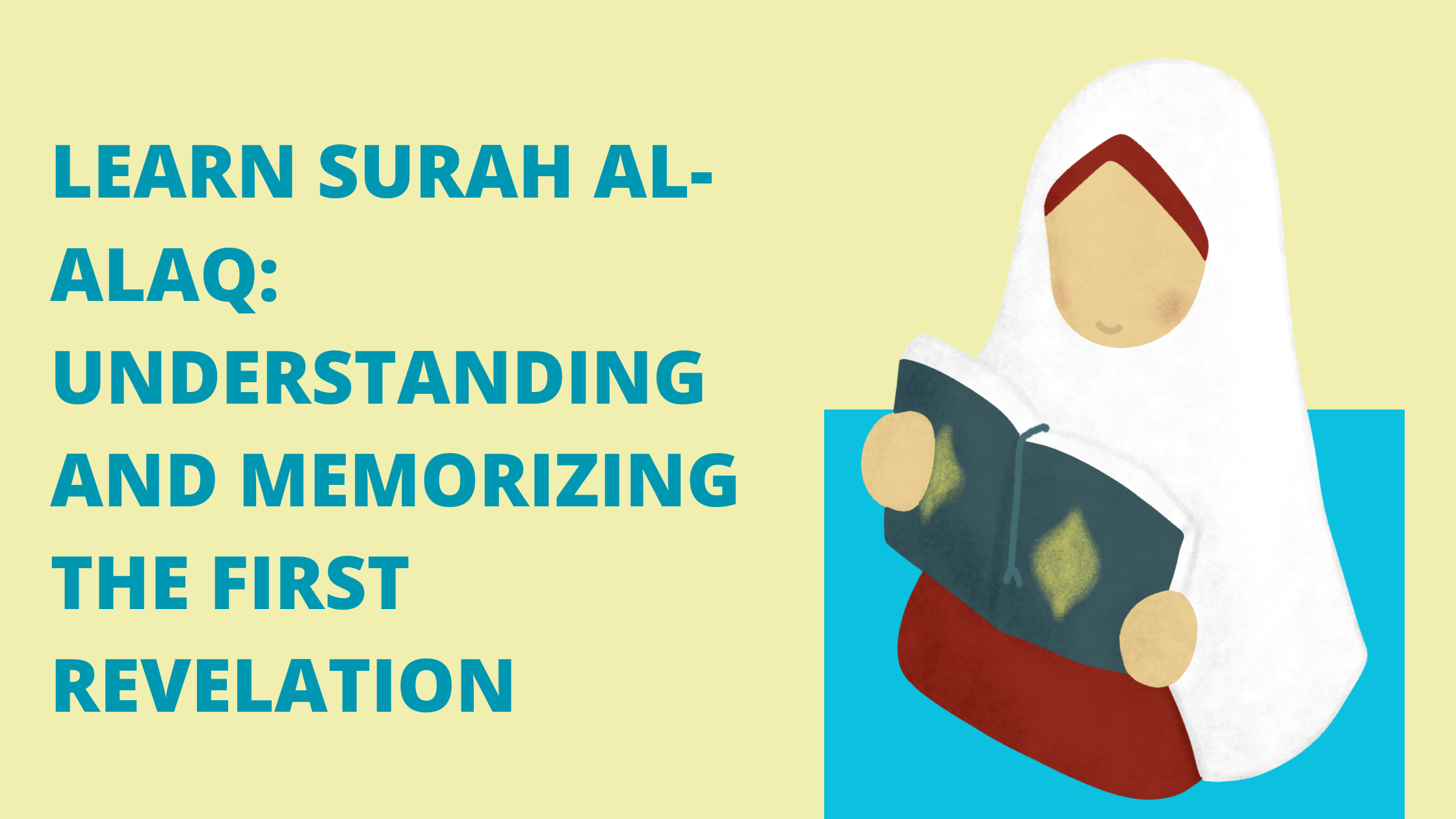Surah Al-Alaq, also known as “The Clot” or “The Clinging Form,” is the 96th chapter of the Quran and holds profound significance in Islamic teachings. Comprising 19 verses, it is historically pivotal as it marks the first revelation received by Prophet Muhammad (PBUH) from the angel Gabriel. This Surah begins with the divine command to “Read,” emphasizing the importance of knowledge, education, and the power of the written word.
Key lessons include the importance of knowledge and education, the recognition of Allah as the Creator, the condemnation of arrogance and rejection of truth, the awareness of accountability and divine oversight, and the encouragement to persevere in faith.
Embracing the teachings of Surah Al-Alaq enhances your understanding of the Quran and strengthens your faith and connection with Allah. Whether you are a beginner or seeking to deepen your knowledge, this guide will support you in mastering the recitation and memorization of this essential Surah.
In this article, we will explore the profound lessons of Surah Al-Alaq, its main message, and practical steps for reading, memorizing, and teaching it, especially to children.
Table of Contents
What is Surah Al-Alaq?
Surah Al-Alaq, also known as “The Clot” or “The Clinging Form,” is the 96th chapter of the Quran and consists of 19 verses. It is historically significant as the first revelation received by the Prophet Muhammad from the angel Gabriel, marking the commencement of his prophethood.
The surah begins with the command to “Read” or “Recite,” emphasizing the importance of knowledge, education, and the power of the written word.
The initial verses highlight the creation of humans from a clot of blood and Allah’s role as the Creator and the Most Generous, who taught humanity through the use of the pen.
This underscores the profound link between divine guidance and the acquisition of knowledge, setting the foundation for the importance of seeking and spreading knowledge in Islam.
The latter part of Surah Al-Alaq warns against the arrogance and denial of those who reject faith and divine guidance. It addresses a specific individual who obstructs the Prophet’s mission and the message of Islam, symbolizing a broader caution against oppression and disbelief.
The surah concludes with a reminder of Allah’s omnipresence and the inevitability of accountability in the Hereafter.
Overall, Surah Al-Alaq encapsulates key Islamic principles, including the pursuit of knowledge, the recognition of Allah’s omnipotence, and the ethical conduct expected of believers, making it a cornerstone of the Quranic message and the prophetic mission.
What are the Lessons in Surah Al-Alaq?
Surah Al-Alaq teaches profound lessons about the importance of knowledge and education, recognition of Allah as the Creator, condemnation of arrogance and rejection of truth, accountability and divine oversight, and encouragement to persevere in faith.
These lessons guide believers in their spiritual and moral conduct, emphasizing humility, the pursuit of knowledge, and steadfastness in faith.
Here are the essential lessons in Surah Al-Alaq:
1. Importance of Knowledge and Education
Surah Al-Alaq begins with the command to “Read” (Iqra), highlighting the significance of knowledge and education in Islam. The first revelation to Prophet Muhammad emphasizes that acquiring knowledge is a fundamental aspect of faith.
The surah also mentions the use of the pen, symbolizing the importance of writing and documenting knowledge. This underscores the duty of Muslims to seek knowledge, educate themselves, and contribute to the intellectual and spiritual growth of the community.
2. Recognition of Allah as the Creator
The surah reminds believers of their humble origins, being created from a “clot” or “clinging substance,” and acknowledges Allah as the Creator. This instills a sense of humility and gratitude in believers, recognizing their dependence on Allah for their existence and sustenance.
It also serves as a reminder of the greatness and generosity of Allah, who not only created humanity but also endowed them with the ability to learn and communicate.
3. Condemnation of Arrogance and Rejection of Truth
In the latter verses, Surah Al-Alaq addresses the arrogance of those who reject divine guidance and obstruct the path of righteousness. It warns against pride and denial of Allah’s signs, highlighting the fate of those who oppose the message of Islam.
This part of the surah serves as a cautionary tale against arrogance and encourages believers to remain humble, obedient, and steadfast in their faith.
4. Accountability and Divine Oversight
The surah concludes by reminding believers of Allah’s omnipresence and the certainty of accountability in the Hereafter. It emphasizes that every action is observed by Allah, and individuals will be held accountable for their deeds.
This lesson instills a sense of moral responsibility and encourages believers to lead a righteous life, conscious of the fact that they are always under Allah’s watchful eye and will be judged accordingly.
5. Encouragement to Persevere in Faith
Despite opposition and challenges, the surah encourages believers to persevere in their faith and remain committed to the path of righteousness.
It assures them that Allah is aware of their struggles and that ultimate success lies in steadfast adherence to divine guidance. This lesson is particularly relevant to those facing difficulties in practicing their faith, providing reassurance and strengthening their resolve.
By reflecting on the lessons of Surah Al-Alaq, believers can deepen their understanding of Islamic teachings, enhance their spiritual journey, and cultivate a life of knowledge, humility, and steadfast faith.
What is the Main Message of Surah Al-Alaq?
Surah Al-Alaq conveys the significance of knowledge, the acknowledgment of Allah as the Creator, and the condemnation of arrogance and opposition to divine guidance. It emphasizes the moral responsibility of believers and encourages perseverance in faith.
Surah Al-Alaq primarily underscores the importance of knowledge and education as divine gifts that distinguish humans from other creations.
The surah begins with the command to “Read” (Iqra), which marks the first revelation to Prophet Muhammad, signifying the commencement of his prophethood. This opening command highlights the central role of literacy, learning, and the dissemination of knowledge in Islam.
It also stresses that knowledge is not an end in itself but a means to recognize and appreciate Allah’s greatness and beneficence, who taught humans through the pen and endowed them with the ability to learn and document information.
Additionally, Surah Al-Alaq addresses the themes of humility and moral accountability. It reminds believers of their humble beginnings from a mere clot and warns against the arrogance and denial of divine guidance.
The latter verses criticize those who obstruct the path of righteousness and highlight the inevitability of divine oversight and judgment. This dual focus on the pursuit of knowledge and the ethical conduct expected of believers serves as a comprehensive guide for Muslims to live a life of intellectual and spiritual fulfillment, always mindful of their accountability to Allah.
How to Learn to Read Surah Al-Alaq?
Learning to read Surah Al-Alaq involves understanding the Arabic script, mastering proper pronunciation (Tajweed), listening to recitations, practicing regularly, seeking guidance from knowledgeable sources, and utilizing online resources.
Here is a detailed guide to help you learn to read Surah Al-Alaq:
1. Understand the Arabic Script
Begin by familiarizing yourself with the Arabic alphabet and its pronunciation. Learning the script is fundamental as it forms the basis for reading any part of the Quran.
Use resources like beginner Arabic books, flashcards, or online tools designed to teach the Arabic alphabet and basic reading skills.
2. Learn Proper Pronunciation (Tajweed)
Tajweed refers to the rules of pronunciation during Quranic recitation. It’s crucial for correctly reading Surah Al-Alaq. Study the rules of Tajweed through books, online courses, or video tutorials. Many apps and websites offer interactive lessons on Tajweed.
3. Listen to Recitations
Listening to Surah Al-Alaq being recited by skilled reciters can help you understand the correct pronunciation and melody. Use platforms like YouTube or Quranic apps to find recitations by well-known Qaris (reciters) such as Sheikh Mishary Rashid Alafasy or Sheikh Abdul Rahman Al-Sudais.
4. Practice Regularly
Consistent practice is key to learning. Set aside a regular time each day to practice reading Surah Al-Alaq. Start by reading slowly, ensuring you pronounce each word correctly. Gradually increase your speed as you become more comfortable.
5. Seek Guidance
Enroll in a Quranic class or seek a knowledgeable teacher who can provide personalized guidance and correct your mistakes. Many mosques and Islamic centers offer Quran classes for different skill levels. Alternatively, online platforms also provide access to qualified tutors
6. Utilize Online Resources
There are numerous online resources available to assist in learning to read Surah Al-Alaq, including websites, apps, and videos specifically focused on Quranic education. Websites like Quran.com and apps like Learn Quran Tajwid provide tools for learning and practicing Quran recitation.
By combining these steps, including understanding the script, learning Tajweed, listening to recitations, practicing regularly, and seeking guidance, you can effectively learn to read Surah Al-Alaq and deepen your connection with the Quran.
How to memorize Surah Al-Alaq?
Memorizing Surah Al-Alaq involves understanding its meaning, breaking it into smaller parts, consistent repetition, using memorization techniques, seeking guidance, and maintaining a consistent practice routine.
Here is a detailed guide on how to effectively memorize Surah Al-Alaq:
1. Understand the Meaning
Before beginning the memorization process, take time to understand the meaning and context of Surah Al-Alaq. This understanding not only deepens your connection with the verses but also aids in retention.
Reflect on the themes of knowledge, creation, humility, and accountability as you memorize.
2. Divide into Smaller Parts
Break Surah Al-Alaq into manageable sections. Start with one verse at a time. Begin by memorizing the first verse completely before moving on to the next. This approach allows you to focus intensely on each segment, ensuring thorough memorization.
3. Repetition and Consistent Review
Repetition is key to memorization. Recite each verse repeatedly throughout the day. Gradually, as you become comfortable with one verse, add the next verse to your practice sessions.
Regularly review previously memorized verses to reinforce retention. Consistency in practice is crucial for long-term memorization.
4. Utilize Memorization Techniques
Explore different memorization techniques that work best for you. Mnemonics, which involve associating verses with familiar concepts or imagery, can aid in retention.
Visualization techniques, where you mentally visualize the words as you recite them, can also be effective. Listening to audio recordings of proficient Quran reciters helps reinforce correct pronunciation (Tajweed) and familiarizes you with the rhythmic flow of the surah.
5. Seek Guidance and Correction
Recite to a qualified teacher or a memorization circle for feedback and correction. They can guide you on proper Tajweed rules and provide insights into the correct pronunciation and recitation style.
Peer support and group memorization sessions can also motivate and encourage your memorization journey.
6. Consistency and Patience
Memorization of the Quran requires dedication and persistence. Establish a daily routine that includes specific times for Quranic memorization. Stay patient with yourself throughout the process, understanding that memorization takes time and effort.
By following these steps consistently and integrating them into your daily routine, you can effectively memorize Surah Al-Alaq and experience the spiritual fulfillment that comes with committing Quranic verses to memory. Remember, the journey of Quran memorization is as enriching as the destination itself.
How to Teach Kids to Memorize Surah Al-Alaq?
Teaching kids to memorize Surah Al-Alaq can be made more engaging and effective by incorporating creative methods such as storytelling, visual arts, interactive technology, personalized rewards, community involvement, consistent practice, parental involvement, mind mapping, and celebrating achievements.
Here is a comprehensive guide on how to effectively teach kids to memorize Surah Al-Alaq:
1. Storytelling
Transform the lessons from Surah Al-Alaq into engaging stories that capture the imagination of children. Narrate the revelation of the surah to the Prophet Muhammad (PBUH) and the significance of its message. Storytelling helps kids connect emotionally and intellectually with the verses.
2. Visual Arts
Encourage children to create drawings, paintings, or crafts that represent the themes and messages of Surah Al-Alaq. For example, they could draw scenes of the Prophet receiving revelation or depict the importance of reading and knowledge. Visual arts can make the learning process more enjoyable and memorable.
3. Interactive Technology
Leverage educational apps and online platforms designed for Quranic learning. Many apps provide interactive games, quizzes, and activities that make memorization fun. Virtual reality (VR) experiences that recreate the historical context of the surah can also be highly engaging.
4. Personalized Rewards
Create a reward system tailored to each child’s interests and preferences. For instance, you could set up a points system where kids earn points for each verse memorized, which they can redeem for special privileges or prizes. Personalizing rewards ensures that children stay motivated and enthusiastic.
5. Community Involvement
Organize group memorization sessions or Quran study circles where children can learn together with their peers. This fosters a sense of community and support. Consider hosting events where children can showcase their memorization achievements, such as a Quran recitation competition or a community iftar.
6. Role-Playing
Incorporate role-playing activities where children can act out the scenarios related to Surah Al-Alaq. For example, they could reenact the moment of the first revelation or simulate a classroom where they teach the surah to their peers. Role-playing makes learning dynamic and interactive.
7. Consistent Practice
Establish a consistent practice routine that fits into the child’s daily schedule. Short, regular sessions are more effective than sporadic longer sessions. Make Quran memorization a part of their daily routine, perhaps integrating it with bedtime or after-school activities.
8. Parental Involvement
Parents play a crucial role in supporting their children’s Quranic memorization journey. Show genuine interest in their progress, listen to their recitations, and provide emotional support. Participate in memorization activities together to strengthen family bonds and demonstrate the importance of Quranic learning.
9. Mind Mapping
Use mind-mapping techniques to help children visualize the structure and key themes of Surah Al-Alaq. Create a central node with the surah’s name and branch out with key points, such as the importance of reading, creation, and divine guidance. This visual tool aids in memory retention.
10. Celebrate Achievements
Celebrate achievements and milestones in memorization. Consider organizing a small family gathering or a special treat when they successfully memorize Surah Al-Alaq or complete a section of the Quran. This reinforces their accomplishment and encourages continued dedication.
By integrating these methods, teaching kids to memorize Surah Al-Alaq becomes an enjoyable and enriching experience. These approaches not only facilitate memorization but also deepen their understanding and appreciation of the Quran, fostering a lifelong connection with the holy text.
Surah Al-Alaq in Arabic with Transliteration
Surah Alaq (سورة العلق) is the 96th chapter of the Quran, consisting of 19 verses. It holds the distinction of containing the first revelation received by Prophet Muhammad (PBUH). Here are the verses in Arabic along with their transliteration:
بِسْمِ اللَّهِ الرَّحْمَـٰنِ الرَّحِيمِ
1. اقْرَأْ بِاسْمِ رَبِّكَ الَّذِي خَلَقَ
Iqra’ bismi rabbika allathee khalaq
2. خَلَقَ الْإِنسَانَ مِنْ عَلَقٍ
Khalaqa al-insana min ‘alaq
3. اقْرَأْ وَرَبُّكَ الْأَكْرَمُ
Iqra’ wa rabbuka al-akram
4. الَّذِي عَلَّمَ بِالْقَلَمِ
Allathee ‘allama bil-qalam
5. عَلَّمَ الْإِنسَانَ مَا لَمْ يَعْلَمْ
‘Allama al-insana ma lam ya’lam
6. كَلَّا إِنَّ الْإِنسَانَ لَيَطْغَىٰ
Kalla inna al-insana layatgha
7. أَن رَّآهُ اسْتَغْنَىٰ
Arra’ahu istaghna
8. إِنَّ إِلَىٰ رَبِّكَ الرُّجْعَىٰ
Inna ila rabbika al-ruj’a
9. أَرَأَيْتَ الَّذِي يَنْهَىٰ
Ara’ayta allathee yanha
10. عَبْدًا إِذَا صَلَّىٰ
‘Abdan idha salla
11. أَرَأَيْتَ إِن كَانَ عَلَى الْهُدَىٰ
Ara’ayta in kana ‘ala al-huda
12. أَوْ أَمَرَ بِالتَّقْوَىٰ
Aw amara bil-taqwa
13. أَرَأَيْتَ إِن كَذَّبَ وَتَوَلَّىٰ
Ara’ayta in kaththaba watawalla
14. أَلَمْ يَعْلَم بِأَنَّ اللَّهَ يَرَىٰ
Alam ya’lam bi-anna Allaha yara
15. كَلَّا لَئِن لَّمْ يَنتَهِ لَنَسْفَعًا بِالنَّاصِيَةِ
Kalla la-in lam yantahi lanasfa’an bil-nasiyah
16. نَاصِيَةٍ كَاذِبَةٍ خَاطِئَةٍ
Nasiyatin kathibatin khati’ah
17. فَلْيَدْعُ نَادِيَهُ
Falyad’u nadiah
18. سَنَدْعُ الزَّبَانِيَةَ
Sanad’u al-zabaniah
19. كَلَّا لَا تُطِعْهُ وَاسْجُدْ وَاقْتَرِب
Kalla la tuti’hu wasjud waqtarib
These transliterations help in understanding the pronunciation and correct recitation of Surah Al-Alaq, aiding in Quranic learning and memorization.
Surah Al-Alaq In English
Surah Al-Alaq (The Clot) is the 96th chapter of the Quran. It contains 19 verses and is significant for being the first revelation received by Prophet Muhammad (PBUH). Here is the translation of Surah Al-Alaq in English:
In the name of Allah, the Most Gracious, the Most Merciful.
“Read in the name of your Lord who created,
Created man from a clot of blood.
Read, and your Lord is the Most Generous,
Who taught by the pen
Taught man what he did not know.
No! [But] indeed, man transgresses
Because he sees himself self-sufficient.
Indeed, to your Lord is the return.
Have you seen the one who forbids
A servant when he prays?
Have you seen if he is upon guidance
Or enjoins righteousness?
Have you seen if he denies and turns away
Does he not know that Allah sees?
No! If he does not desist, We will surely drag him by the forelock
A lying, sinning forelock.
Then let him call his associates;
We will call the angels of Hell.
No! Do not obey him. But prostrate and draw near [to Allah].”
This English translation captures the essence of Surah Al-Alaq, emphasizing themes of creation, the importance of knowledge, and the consequences of transgression and denial. It calls believers to recognize Allah’s omniscience and to seek closeness to Him through prayer and humility.
Learn the Quran Online With Bayan al-Quran Native Arab Tutors:
Embark on a transformative journey of Quranic learning with Bayan Al-Quran’s comprehensive online courses. Our platform offers an authentic and immersive experience tailored to learners worldwide. Whether you’re a beginner or seeking to enhance your skills, our Tajweed courses provide expert guidance and structured learning to master the art of Quranic recitation.
🎓 Expert Guidance:
Benefit from experienced instructors who specialize in Tajweed, breaking down complex rules into manageable segments for learners of all levels.
✨ Key Features:
- Structured, step-by-step learning approach.
- Access to high-quality instructional materials.
- Real-time feedback from qualified tutors to enhance your practice.
- Flexible learning schedules to accommodate your pace and convenience.
- Immerse yourself in the melodious tones of Quranic recitation, enriching your spiritual experience.
🌟 Why Choose Bayan Al-Quran?
Join our vibrant community dedicated to perfecting Quranic recitation. Build a profound connection with the divine words of the Quran and enrich your spiritual journey. Choose Bayan Al-Quran for a transformative learning experience and embark on a path to mastering Tajweed with confidence.
You can also attend online Quran Classes with Bayan al-Quran with Native Arab tutors. There are also several courses that can help you in this regard.
Conclusion
In conclusion, learning and memorizing Surah Al-Alaq is an enriching journey that emphasizes the profound connection between divine guidance and the pursuit of knowledge.
This surah, as the first revelation received by Prophet Muhammad (PBUH), sets the foundation for key Islamic principles, including the importance of education, humility, and accountability.
By understanding its meaning, incorporating various memorization techniques, and using creative methods to teach children, we can deepen our spiritual understanding and strengthen our faith.
By dedicating time to learn, teach, and reflect on Surah Al-Alaq, we can foster a lifelong connection with the Quran, nurturing a community that values wisdom, humility, and perseverance in faith.


















